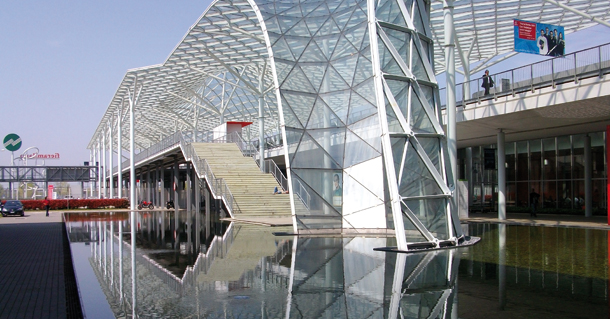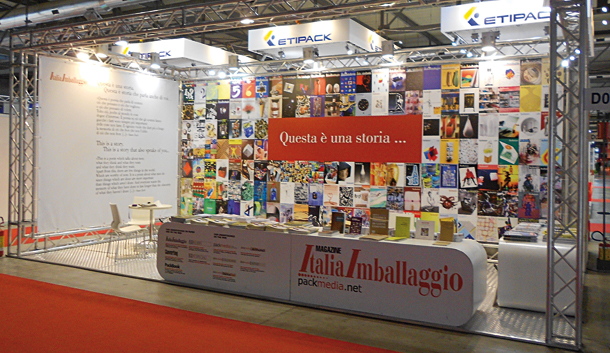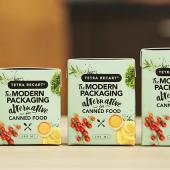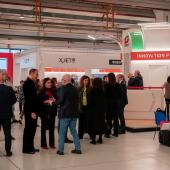Commentary of events
Practically speaking it has only just ended, but is already looking at 2015 with pondered optimism. We obviously speak of the 22nd edition of IPACK-IMA that - it seems to us - was able to combine the solidity of the technological proposals with the farsightedness of an extended view of things.
Ipack-Ima featured five days full of content with considerable space for in-depth studies, fundamental not only for starting up positive and longstanding business relations but also for taking ones view of things that little bit further. The talk held by the Italian astronaut Paolo Nespoli, opening the show, was illuminating on this count, likewise important the official announcement of the agreement reached between Ipack-Ima SpA with Expo 2015 (that will lead the two bodies to organize joint undertakings on international markets to promote the grand event) and with FieraMilano (with which the agreement has been renewed up to 2021).
IPACK-IMA transversally featured attention to consumer-, human and environmental safety, a field in which packaging expresses obvious and undeniable potential.

The demonstration of this prime feature of packaging lies in the keen interest aroused by the largescale conference “Enhancing food safety and food security in Africa: processing and packaging technologies from farm gate to the consumers table” promoted by the FAO… But also in the full attendance of the encounter dedicated to the second phase of the CAST project, the collecting together of the guidelines on the good practises for all the packaging chains that deal with food products, result of the joint work of the Istituto Italiano Imballaggio, the Italian National Institute for Health and the associations that represent the packaging and the food industry segments.
The subject of safety was also declined in various ways by the many sector associations, that experienced the show as an event for encounters and exchanges with the market, the same as the many producers that animated the Innovation Corner, spread throughout the various halls of the show.
But let us now go on to the official figures announced by the organisers of IPACK-IMA 2012: 54.000 total visitors, 25% from abroad, particularly from Asia, Africa and the Americas; 1.300 the exhibiting companies, 35% of which from 35 foreign countries. The figures are “good”, they speak of vitality and enterprise, of programs to be shared and investments, thus relaunching the image of Italian packaging in an international dimensions.
We did register some dissent (truly little), that in particular complained about the poor attendance in the first days and the excessive costs (not repaid by the number of contacts had at the stands). We also feel duty bound to pass on the comments of those, in particular, who emphasised the dangerous and senseless split in the Italian packaging fair system, that features two largescale contenders, Ipack-Ima and Ucima. Given that we have always been in favour of the settlement of this damaging rift, we can only join the chorus of those who don’t want to waste energy and wish to favour the unity of an industrial sector that is an example of Italian excellence.
For our part, lastly, we can bear witness to having gathered a lot of approval as to the “quality” of the presences at the fair, this both in terms of the decisional role of the visitors as well as in terms of the business projects that were started up at Ipack-Ima.
And now, we start our brief account - both commentary and comment - of the five days in Milan, experienced with intensity, passion and - why not say it? - also a certain pride in feeling oneself part of a world that never stops inventing, experimenting and producing.
Ipack-Ima, day by day (not everything, but all kinds of things)
February 28th
9 am.

Starting at last. Ipack-Ima starts up in a troublesome moment of uncertainty, between great expectations and unconfessed fears. Edizioni Dativo’s stand is at the entrance to Hall 24, with an extensive facade bearing all the covers of ItaliaImballaggio, published from 1994 to this day: 18 years of sector history, communicated, illustrated and shared with passion. Indeed the design did look good on paper, but in real life it was really quite another matter.
10.30 am.
Flying high. Amidst the welcomes of the organizers and the positive market readings obtained by the business community industrial observatory, around which Ipack Ima 2012 was constructed, the official opening of the event was entrusted to an exceptional testimonial, Italian astronaut Paolo Nespoli, deputy commander of an expedition lasting 159 days on the International Space Station and first Italian astronaut to carry out a longterm mission in space. He spoke of shared technological progress and the key role played by packaging in a correct and safe sojourn in space. He speaks as a scientist, as of course he is, but also from the heart and he knows how to get people involved, telling how a spacecraft in orbit becomes the ideal "backstage" for scientific research. And this offered a potent lead-in for Paolo Barilla (president of this edition of the show), who emphasized how much research can and should still do to improve the lives of individuals, suggesting possible alternatives towards a more aware consumption.
14.30 pm.
From cradle to cradle. Open innovation, LCA, web-based platforms and collaboration are the keys to produce packaging in an increasingly sustainable way. The National Packaging Consortium, convinced of the same, at the conference "Prevention is Innovation”: CONAI’s new LCA tool" presented Eco Tool. This is a new tool for simplified analysis of the environmental impact of packaging, which will allow the consortium to evaluate the eco-efficiency of its packaging through a "before and after" comparison in terms of environmental impact (reduction of CO2 emissions, consumption of energy and water). This in view of their participation in the Prevention Dossier.
The study, commissioned by CONAI from Research Center on Sustainability and Value of Bocconi University (CReSV), analysed the state of the art in the field of prevention internationally with a specific focus on packaging and packaging waste. The project involved 11 countries and 20 companies and the results provide a mapping outlining the main features of the prevention strategies that are emerging on a global scale. At the panel discussion "Sector chains and prevention" the heads of CNA, Cial, Comieco Rilegno and Corepla Coreve intervened, moderated by Lorenza Gallotti (Director e-gazette.it)
29th February
10.00 am.
Print and converting: a premiere. Our visit to the Acimga "Package Printing" area, structured in small uniform stands where Cason, Delsar Lame, Flexotecnica, I&C along with Gama, Martignoni Elettrotecnica and Omet, Erhardt+Leimer, Lohmann, Re Controlli Industriali, Rossini, Simec, Uteco (another three printing and converting machine and solution builders affiliated to Acimga took part at the show with their own stands: Sitma, Bosch Rexroth, Provera). In between, an institutional lounge welcomes members and visitors. The idea is simple and effective: preside over a trade show, with a nominal cost, where both exhibitors and visitors are potential customers of the printing and converting technology manufacturers. The final judgements of the fair were without reserve: Exhibitors in the collective were fully satisfied with the amount of contacts made. Right on the mark the first time around.
10.30 am.
In the name of safety. A smart pairing up, that of Giflex and Gipea, that gave rise to the very well attended and lively joint panel discussion, "flexible packaging, pressure sensitive labels and sustainability: a winning combination!" The promoters sought to stress the crucial role of flexible packaging and labels in ensuring consumer safety, in reducing the waste of resources and in conveying information on environmental issues. Concrete and effective the debate, coordinated by Stefano Lavorini, which saw the involvement of Alessandro Lepori and Carmela Magno (Vibac Group), Giovanni Panzeri (Conad), Luca Ruini (Barilla G. & R. Fratelli SpA), Andrea Murello (Gipea), Michele Zanutto (Giflex). The discussion topics were, sustainability, understood not only in terms of respect for the environment but also as a concept to be translated in social and economic terms. Hence the presentation of company business plans designed to encourage the reduction of waste of food resources (in the light of the recent pronouncement of the European Parliament on the value of packaging as a tool to fight food waste).
11.00 am.
Health supplier industry. Exceptional scenario for the launch of the next edition of Pharmintech (Bologna, 17-19th April 2013), featuring the president of BolognaFiere Duccio Campagnoli, Roberto Kerkoc and Guido Corbella, respectively President and CEO of Pharmintech Srl (company formed following the agreement between BolognaFiere and Ipack-Ima and also owned by Unindustria Bologna), Giampaolo Vitali (author Pharmintech Observatory Trends Survey), Sergio Dompé (President Pharmintech 2013).
In various ways all emphasized the innovative and collaborative approach of the event, determined by a steering committee on which sit important sector users and producers users, with the full support of Farmindustria, and by having been able to bring together powerful figures in the Italian trade fair/industrial panorama. Given the good performance of the Italian pharmaceutical industries, shown in the survey prepared by Vitali, the other new feature is the partial overlap in time with the show Cosmofarma, which strengthens the contact of the supplier industry with the pharmaceutical industry production chain.
4.00 pm.
Responsibly. Inauguration of the didactic show “Responsibly. Packaging: instructions for daily action”, inserted in the space “Designing the Future”; the multidisciplinary area set kup in cooperation with Conai. On show some packaging designs developed in the Degree in Communication Design at the Milan Polytechnic. These are the results of a research-teaching which placed the center of the discussion on the notion of responsibility, declined according to different meanings: prevention, security and progress. Within this perspective, the projects on show constitute examples of the capacity of the “packaging-medium” to respond to the challenges that the product system of poses, renewing their communicative function and improving the quality of our daily actions.
16.30 pm.
Rendezvous with the packaging awards. A “technological” packaging Oscar, that of 2012. Held under the auspices of Ipack-Ima, the competition organized by the Istituto Italiano Imballaggio indeed aimed at awarding the solution that - thanks to evolved technical devices – highlighted the primary qualities of packaging’s capacity to protect, its function of use, its sustainability. 24 the products in the final heats, with 9 winners (with 2 equal firsts) of the various categories on show at the space "Designing the Future" set up in the Halls of the Milan , namely: Officine Grafiche Di Mauro, Sealed Air Srl Cryovac, Sanpellegrino, Gruppo Cartotecnico Abar Litofarma, Sacart, Krones, Bormioli Rocco, Lindt & Sprüngli, Heinz Italia.
1sh March
09.30 am.
Africa: conference on a grand scale. Start, with a vast audience (despite the transport strike), of the international conference "Enhancing food safety and food security in Africa: processing and packaging technologies from the farm gate to the consumers table" promoted by FAO - United Nations Food and Agriculture Organization, UNIDO - United Nations Industrial Development Organization, WFP - World Food Programme, IFAD - International Fund for Agricultural Development and the Italian Ministries of Economic Development and Agricultural and Forestry Policies, with the support of Conai.
Premise: 50% of fruit and vegetables produced in sub-Saharan Africa (and 55% in North Africa and the Middle East) does not reach consumers; so too 20% of grain produced (30% in North Africa). In the various opening speeches other figures documented the enormous development potential of the African Continent, which what is more for years has experienced a significant growth.
The institutional speakers were high profile: after Guido Corbella and Paolo Barilla, Kandeh Yumkella, UNIDO Director-General took to the rostrum, followed by Richard Sezibera, Secretary General of the EAC, the East African Community organization, followed by the Chairman of the Scientific Committee Claudio Peri, and by speakers from prominent universities, institutions and companies: Apofruit, Bonduelle, Casillo Group, Canned Italy, Felicetti Pasta, Riso Scotti, Solana ...
And the audience? Many the women present, among the officials of embassies and international institutions, industry operators interested in developing trade relations with African countries, representatives of institutions for economic mediation, representatives of the food chain of the most vibrant African states, aboveall featuring black Africa (many the delegations invited by Ipack-Ima).
Striking the concrete stance of the conference, which aims to facilitate the encounter between local demand and supply of technologies, knowhow, products as well as skills transfer. Among the initiatives already underway, focus on the first exhibition for food packaging and processing in Eastern Africa, established by the agreement between Ipack-Ima, UNIDO and the East African Community. It will be held in Nairobi in 2014 and will be introduced next year, by an international conference on food safety. The unofficial remarks of Guido Corbella, creator of the first trade show organized by the Italians in this part of the world, were tinged with pride.
In turn the thousand (vegetable) gardens in Africa project targets individual involvement, launched by Slow Food, to start self-managed cultivation in schools, villages and city suburbs. It starts out from the Terra Madre Network (Kenya, Uganda, Ivory Coast, Mali, Morocco, Ethiopia, Senegal, Tanzania...) to then expand into other countries of the continent. "Adopt a garden" or that is support the management for a year costs 900 euros.
14.00 am.
Africa: the contribution of the companies. Assuming that the actions to be taken to improve food security in Africa are many, as are many the challenges facing the local industry, the second part of the day hosted interventions by famous Italian food companies that have proposed specific cases of product innovation.
• Solana (which processes about 200,000 t/year of tomato) has partnered with Goglio SpA to develop a moisture barrier bag capable of improving the taste and preventing damage to the product (ohmic unit - aseptic filling).
• Conserve Italy Group (the cooperative represents 14,500 farmers and produces fruit juices under its own brand or private label) has developed a new fruit based beverage, and for young children it has launched Yoga, their first nectar, with 90% of Italian fruit and Frutty CAO (100% nectar, with added cocoa). The packaging and promotional campaign were specifically designed to communicate nutritional values and wholesomeness of the product.
• Bonduelle Italia (active in the fresh-cut produce market) has diversified its offer by adopting packages to meet different types of consumption: convenience (ready-washed salad), nomad (shake and taste), health and wellness (products rich in omega 3).
• Worthy of note also the project, that starting from the considerations put forward by some East Africa institutions, has led Unido, in collaboration with Ipack-Ima and the University of Milan, to think of a "Co-packer center" for packaging cereals, fruit and vegetables. It was therefore established a working group that, based on the principle of sustainability, defined the key issues (support for local economies, production and definition of processes) to complete the first launch of the center prior to Expo 2015.
2.30 pm.
Faith in food packaging. During the conference, "Choosing packaging in food safety" organized by AIDEPI (Association of Italian Confectionery and Pastamaking Industries, one of the promoters of Ipack-Ima) the quality assurance offered by the Italian packaging sector was acknowledged. Also underlined the need to close ranks, involving all players in the sector (food manufacturers, packaging companies and controlling bodies) so that the technological innovations and best practices developed by individual operators are shared across the system to boost the Italian market.
During the day announcement of Ipack Ima’s group's second collaboration with Messe Düsseldorf, after Upak Italia-Upakovka, this being PACKTECH India, the packaging and wrapping fair scheduled from 6th to 8th November in Mumbai. The fair, organized by Messe Düsseldorf, sees Ipack-Ima SpA as the sole reference oint for Italy and for Italian companies. The exhibition will run concurrently with DrinkTech, organized by Messe München. The Ronchi Group, manufacturer of advanced filling and bottle capping systems for liquid detergents, cosmetics and bottle orientation, has confirmed its presence.
2nd March
11.00 am.
Vending winners. Another interesting premiere at the show: Lucio Pinetti, President of Confida not only introduced the automatic vending distribution market in Italy (that what is more is expanding, with 20 million Italians who in 2011 consumed at least one product), but he opened the first edition of the prize for the best vending machine product packaging design. Reliable dispensing, consumer safety, convenient logistics and correct communication were the features awarded as the factors that determine the success of a vending machine.
11.00 am.
A “Paper fan club”. Presentation of a new Comieco project, that brings the manufacturers and users of cellulose packaging together: The Paper and Board Club, established with the objective of fostering and sharing everything that you need to know on cellulose in terms of packaging innovation and sustainability. The initiative expresses particular attention to the entire production chain, with the aim of spreading the most interesting best practices, Italian and international. Awarded by the full appreciation of the consumers - as stated in the surveys carried out by sociologist Enrico Finzi, Astra Research – the story of cellulosic packaging was “told” during the event (moderated by Piero Capodieci) featuring successful case studies: the experience of a user such as Barilla (Maurizio Bonuomo) and the development of lightweight recycled paper, the frontier eco-friendly packaging presented by Gruppo Progest (Francesco Zago).
2.00 pm.
CAST 2 projected into Europe. The Italians are precursors of a transversal and innovative approach to packaging and food safety, which is now being "exported" to Europe. Presented at the fair the state of the art of the second phase of the CAST project (called CAST 2), concerning good practices to be followed to comply with European legislation on safety in food packaging. The project, carried out by the Istituto Italiano Imballaggio together with the National Institute for Health in collaboration with the major associations representing different sectors of the packaging and the food industry, was originally only intended for the Italian industry, but it is now also gaining ground in Europe as an example of cross-sector cooperation between concerns operating in different fields and product control institutions.
3rd March 2012
Ending on a high note. Tired but happy, we got back to where we started out from: Edizioni Dativo’s stand at the entrance to Hall 24, where we registered a greater than expected flow of visitors and readers interested in all our products. We can say that the "story", for us, will be continued: in "technical reports" to be published in our magazine ItaliaImballaggio and testimonies we collected, speaking of a desire to get on with things, and to do even better.




















